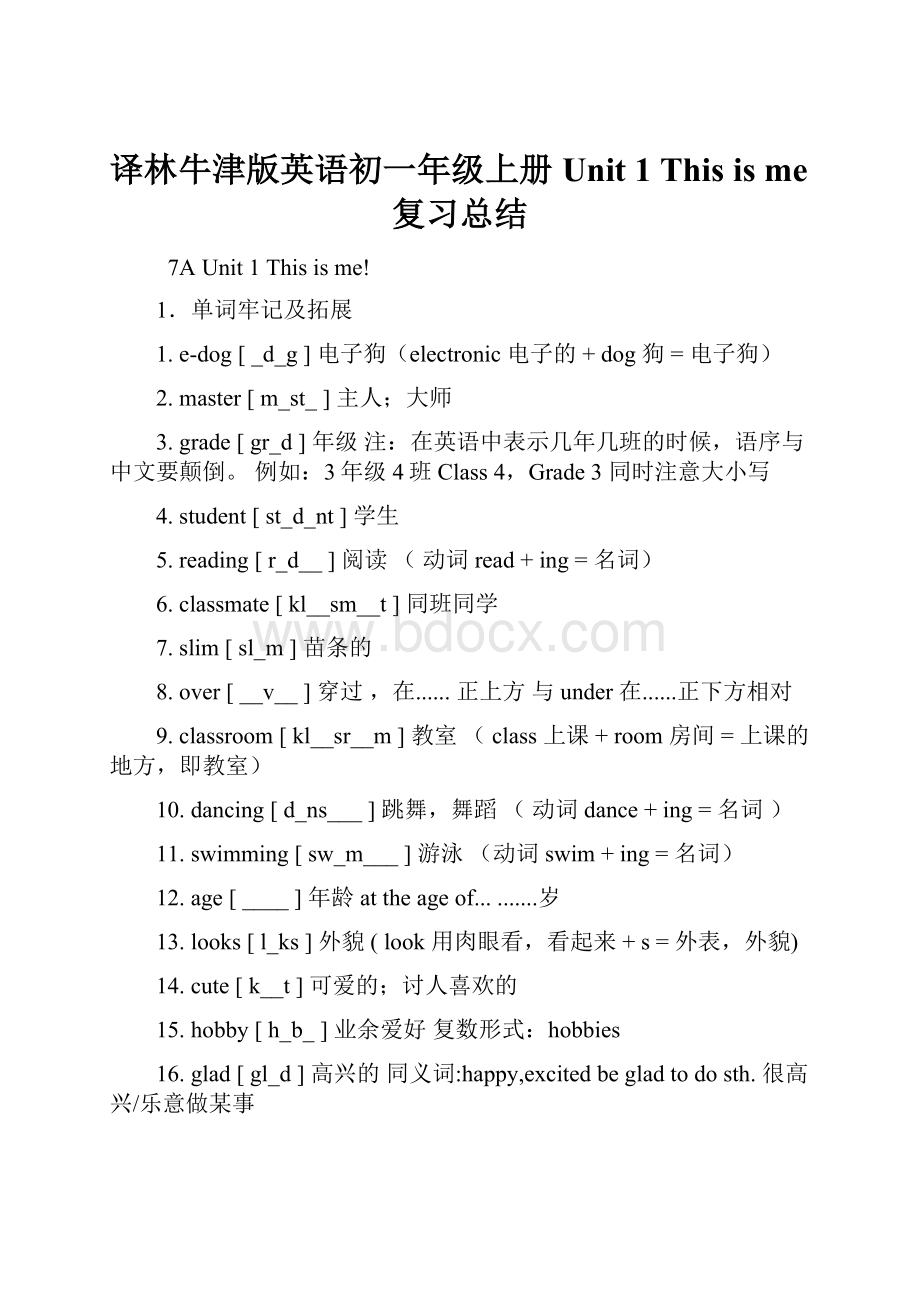译林牛津版英语初一年级上册Unit 1 This is me复习总结.docx
《译林牛津版英语初一年级上册Unit 1 This is me复习总结.docx》由会员分享,可在线阅读,更多相关《译林牛津版英语初一年级上册Unit 1 This is me复习总结.docx(15页珍藏版)》请在冰豆网上搜索。

译林牛津版英语初一年级上册Unit1Thisisme复习总结
7AUnit1Thisisme!
1.单词牢记及拓展
1.e-dog[_d_g]电子狗(electronic电子的+dog狗=电子狗)
2.master[m_st_]主人;大师
3.grade[gr_d]年级注:
在英语中表示几年几班的时候,语序与中文要颠倒。
例如:
3年级4班Class4,Grade3同时注意大小写
4.student[st_d_nt]学生
5.reading[r_d__]阅读(动词read+ing=名词)
6.classmate[kl__sm__t]同班同学
7.slim[sl_m]苗条的
8.over[__v__]穿过,在......正上方与under在......正下方相对
9.classroom[kl__sr__m]教室(class上课+room房间=上课的地方,即教室)
10.dancing[d_ns___]跳舞,舞蹈(动词dance+ing=名词)
11.swimming[sw_m___]游泳(动词swim+ing=名词)
12.age[____]年龄attheageof..........岁
13.looks[l_ks]外貌(look用肉眼看,看起来+s=外表,外貌)
14.cute[k__t]可爱的;讨人喜欢的
15.hobby[h_b_]业余爱好复数形式:
hobbies
16.glad[gl_d]高兴的同义词:
happy,excitedbegladtodosth.很高兴/乐意做某事
17.everyone[_vr_w_n]每人,人人(every每个+one=everyone)
18.glasses[gl__s____](复)眼镜(glass玻璃+es=两块玻璃构成眼镜)
2.重点词组
1.lookafter/takecareof照顾;照看
2.lovee-dogs/reading/sports喜欢电子狗/阅读/运动
3.goodmorning/afternoon/evening早上/中午/晚上好
4.welcometoclass1,grade7欢迎来到七年级一班welcomehome欢迎回家
5.anewstudentatSunshineMiddleSchool阳光中学的一名新学生
6.12yearsold12岁
7.mynewclassmates我的新同班同学
8.playfootball踢足球
9.afterschool放学后
10.comefrom/befrom来自
11.begoodat/dowellin(doing)sth擅长于做某事
12.havelong/shorthair有着长/短发
13.overthere在那边overthedesk在课桌的正上方
14.chinese/English/Mathsteacher语文/英语/数学老师
15.livewithmyfamilyinBeijing和我的家人一起住在北京
16.wearglasses戴眼镜
17.likeallthelessons喜欢所有的课程
18.benice/kind/friendlytosb.对某人友好的
19.haveane-dog有一只电子狗
3.重点句型
1.What’syourname?
你叫什么名字?
2.MynameisHobo./IamHobo.我叫霍波。
3.Howtolookafteryoure-dog.怎样照顾你的电子狗。
4.Nicetomeetyou./Gladtomeetyou.见到你很高兴。
Nicetomeetyoutoo./Gladtomeetyoutoo.见到你我也很高兴。
5.Nowlet’smeetmynewclassmates.现在让我们来会见一下我的新同班同学。
6.Hi,Kitty.ThisismycousinAndy.Andy,thisismynewclassmateKitty.
你好,基蒂,这是我的表哥安迪。
安迪,这是我的新同学基蒂。
7.Sheistallandslim.她既高又瘦。
8.Oh,Isee.喔,我明白了。
9.IcomefromNanjing,butnowIlivewithmyfamilyinBeijing.
我是南京人,但是我现在和家人住在北京。
4.语法解析
1.喜欢做某事
Like/lovetodo/doingsth.
Enjoydoingsth.
Befondofdoingsth.
用动词的适当形式填空:
1.Amylikes______inthelibrary.(read)
2.Mymotherloves______verymuch.(shop)
3.()Mymotherloves_______atweekends,butmyfatherlikes______athome.
A.shop;stayB.shopping;tostayC.shopping;stayD.shoping;staying
2.几岁(表年龄)的多种表达
例如:
我12岁了。
I’m12yearsold.
I’maboyof12.
I’ma12-year-oldboy.
I’mattheageof12.
句型转换:
1.TheboyinblackT-shirtis13yearsold.
_______________________________________________(对划线部分提问).
TheboyinblackT-shirtis____________________________.
3.Puton/wear/in
Puton“穿、戴”,指穿的动作,后接要穿、戴的东西,其反义词为:
takeoff脱下
例如:
It’scoldtoday.Putonyourcoat,please.
Wear“穿、戴”,指穿的状态
例如:
Manygirlswearskirtsinsummer.
Sandywearsglasses.
In“穿着”介词,后接衣服,也可接衣服,既可作定语,也可作表语。
例如:
ThegirlinredisKitty’ssister.
Thewomanisinblue.
用适当的词填空:
*_______ your coat. It’s cold today.
*The man always _____ a black hat.
*She felt a bit cold and found she was only _____ her sweater. She left home in such a hurry that she forgot ______ her thick coat.
4.Letusdosth.征求对方意见,对方不加入
Let’sdosth.包括了征求其意见的对方,表示大家一起做某事。
例如:
Letusplaybasketball.(请你)让我们打篮球吧。
Let’splaybasketball.咱们打篮球吧。
5.Playfootball踢足球(球类运动不加冠词the)
Playthepiano(弹奏乐器要加冠词the)
6.表地点时in/at的区别
in通常指大地方,比如:
洲、国家、城市等;
虽然是小地方,但说话人住在那里的情况下,也可用in。
商店、学校、机关等,若看做一个地点时用at,看做一个场所时用in。
例如:
Imethimatthepost-office.
Iamworkinginthepost-office.
at通常指小地方,如车站、码头、村子、农场、工厂、学校等。
用于门牌号码前。
例如:
Iarrivedatthepost-officeat9o’clockinthemorning.
Helivesat11ZhongshanRoad.
on表示地点,一般指与面或线接触,意为“在……上;在……旁”。
如:
The picture was hanging on the wall.
随堂练:
1.I’m _______ China.
2.I’ll meet my uncle _______ the airport _____five past one.
3. There’s a picture __________ the wall.
4.Johnis_____thehospital.
5.There is a bird ___ the tree.
6.There are many apples _____ in the tree.
7.Iputacupoftea____thetable.
8.I saw a cat ___ the corner of the street.
7.欢迎来到某地:
welcometosp.但表示欢迎回家时,用welcomehome.
欢迎某人:
welcomesb.
8.含be动词的一般现在时
be动词是系动词的一种,表示“……是……”的意思。
现在式有am,is,are三种。
这三种动词的原形是be,所以它们称为be动词。
8.1be动词的现在式
be动词的现在式有am,is,are三种,分别接在不同人称的主语之后:
8.2be动词句型的构成
肯定句:
主语+be动词(am/is/are)...
例如:
Iamadoctor.我是一名医生。
Maryisatwork.玛丽在工作。
Heisverybrilliant.他非常聪明。
否定句:
主语+be动词(am/is/are)+not...
例如:
Wearen'therclassmates.我们不是她的同班同学。
I'mnotTom.我不是汤姆。
(I'm是Iam的缩写,读作/aim/。
)
It'snot/Itisn’tacat,butadog.这不是猫,而是狗。
注:
be动词否定句的缩写方式:
isnot的缩写是isn't,读作/′iznt/;arenot的缩写是aren't,读作/a:
nt/;Iam~的否定句是Iamnot~,缩写为I'mnot~;amnot不缩写在一起。
疑问句:
be动词(am/is/are)+主语...?
回答方式:
Yes,主语+be动词(am/is/are)...
No,主语+be动词(am/is/are)+not...
注:
be动词的一般疑问句是将be动词置于主语之前(大写am/is/are的第一个字母),在句尾加问号;这种语序是主语和谓语倒装语序:
例如:
肯定句:
Theyarefruit.它们是水果。
疑问句:
Aretheyfruit?
它们是水果吗?
(主语和谓语倒装)
肯定句:
Thebookisonthetable.书在桌子上。
(主语和谓语倒装)
疑问句:
Isthebookonthetable?
书是在桌子上吗?
8.3行为动词结构
肯定式
疑问式
否定式
否定疑问式
Iwork.
Doyouwork?
Idon'twork.
Don'tyouwork?
Youwork.
Doyouwork?
Youdon'twork.
Don'tyouwork?
Wework.
Doyouwork?
Wedon'twork.
Don'tyouwork?
Theywork.
Dotheywork?
Theydon'twork.
Don'ttheywork?
He(She,It)works.
Doeshe(she,it)work?
He(She,It)doesn'twork.
Doesn'the(sheit)work?
8.4当主语是第三人称单数时:
动词变相应的第三人称单数形式
肯定句主语+动词s+其它
否定句主语+doesn't+动词原形+其它
一般疑问句Does+主语+动词原形+其它
肯定回答Yes,主语+does
否定回答No,主语+doesn't
8.5特殊疑问句特殊疑问词+一般疑问句
当主语不是第三人称单数时:
肯定句主语+动词原形+其它
否定句主语+don't+动词原形+其它
一般疑问句Do+主语+动词原形+其它
要注意,句式结构错则全都错。
谓语动词的形式:
do/does
8.6动词变化规律
情况
构成方法
读音
例词
一般情况
加-s
清辅音后读/s/
浊辅音和元音后读/z/
swim-swims;help-helps;
like-likes
以辅音字母+o结尾的词
加-es
读/z/
go-goes,do-does
以s,sh,ch,x等结尾的词
加-es
读/iz/
watch-watches,
wash-washes
以辅音字母+y结尾的词
变y为i再加es
读/z/
study-studies
不规则变化have和be动词
变have为has
变be为am,is,are
have-has
be-am,is,are
8.7具体运用
1.表示经常的或习惯性的动作,常与表示频率的时间状语连用。
时间状语:
always,usually,everymorning/night/evening/day/week/year,often,sometimes,occasionally,fromtimetotime,twiceaweek,rarely,seldom,onceamonth,hardly,ever,never.
e.g.Ileavehomeforschoolat7:
00everymorning.我每天早上7点左右离开家去学校。
2.表示主语具备的性格、能力、特征和状态。
e.g.Idon'twantsomuch.我不想要太多。
AnnWangwritesgoodEnglishbutdoesn'tspeakwell.王安英语写得很好但是说的不好
比较:
NowIputthesugarinthecup.现在我把一些糖放杯子里面。
Iamdoingmyhomeworknow.现在我正在写我的作业。
3.客观真理,客观存在,科学事实。
Theearthmovesaroundthesun.地球绕着太阳转。
ShanghailiesintheeastofChina.上海市在中国的东部。
随堂练:
1. I usually_______________(go) running for an hour
2.He_______________(not play) tennis on Sunday.
3. She ____________(like) reading a book after school.
4. Who teaches_____________(they) physics?
5. Kitty_______________(not wear) glasses in class.
6. She is a nurse. She _________________(take) care of sick people.
7. David____________(have) a dog.
8. Eddie doesn’t know how______________(look) after Hobo.
9. They always___________(go) out to have dinner.
10. Emily_____________(be) a good student. She ____________(work) hard.
11. Many children_____________(love) fast food.
12. I __________(not work) in an office.
13. __________she ___________(have) long hair?
14. The cat____________(be) three weeks old
15. You __________(be) late for an hour.
16.___________(Daniel) father is a doctor.
17. I like all my_______________(lesson).
18. She______________(be) born in October.
19.We often have ____________(we) dinner at my___________(grandfather) home.
20. This____________(be) _____________(he) bag.
7AUnit1
一、选择填空:
(一)
( )1.He goes to school by bus, but he walks ________ after school.
A. to home B. home C. his home D. the home
( )2.She likes _______. She is a good ________.
A. swim; swimming B. swimming; swimmer
C. swimmer; swimming D. to swim; swim
( )3. I like reading, I often go to _________.
A. the classroom B. the Reading Club
C. the teacher’s office D. the bus
( )4. I like talking on the phone with my friends. __________.
A. Me ,too B. You are right C. Yes, I do D. I enjoy
( )5. Excuse me,____ do you say that in English?
A. how B. who C. where D. which
( )6. ---Did your parents go to climb the mountain last Sunday?
---- No, they _______ went to see a film.
A. both B. all C. either D. every
( )7. Can I ___ your new watch?
Sure.
A. look at B. look after C. look for D. look like
( )8. Jack_____ doing his homework at eight.
A. finish B. finishs C. finishes D. don’t finish
( )9. ___ the boys enjoy____ the World Cup?
Yes, they ______.
A. Does, watching, does B. Do, watch. Do
C. Do, watching, do D. Does, watch, do
( )10. He says “_____” to his parents before he goes to bed.
A. Good evening B. Good bye C. Going to bed D. Good night
( )11.---Dad,____ is my MP3?
---- I put it in your desk.
A. what B. how C. whose D. where
( )12. I want to _____ a teacher when I grow up.
A. be B. do C. am D. is
( )13. I’m____ next year.
A. 13 years B. 13 year C. 13 years old D. 13 year old
( )14. There___ five people in my family.
A. is B. are C. have D. has
( )15. That’s____ football. I like playing_____ football very much.
A. a , the B. a, / C. a., a D. the, /.
( )16. ____ you _____ a pen?
A. Do, have B. Have, / C. Have do D. A and B
( )17. He enjoys_____ the radio.
A. to listen B. to listen to C. listening D. listening to
(